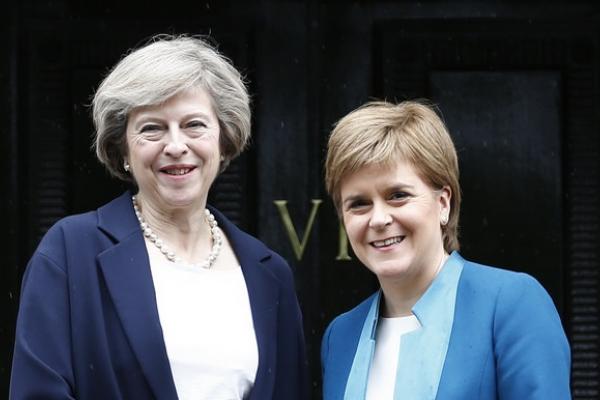Theresa May has called the Scottish Government's bluff over any suggestion that Scotland and rUK will have different relationships with the EU, says Kirsty Hughes. It's now up to the Scottish Government and Parliament to decide how to react.
Theresa May’s speech to the Tory party conference on Sunday threw down the gauntlet to the Scottish Parliament and Government in their exploration of options for Scotland to remain in the EU or at least the single market while the rest of the UK leaves. May was brief and brutally clear: “We will negotiate as one United Kingdom, and we will leave the European Union as one United Kingdom”, adding “there is no opt-out from Brexit”.
Nicola Sturgeon’s Standing Council on Europe, currently looking into options for Scotland to stay in the EU and/or the single market, is – according to May’s speech – wasting its time. Scottish Secretary David Mundell reinforced this view on Monday: “I think there isn’t anybody over the last few months who suggested any realistic and credible basis on which Scotland could somehow remain in the EU while the rest of the UK left the EU.”
May’s approach discards options such as a ‘reverse Greenland’ approach – with Scotland, Northern Ireland and Gibraltar staying in the EU while England and Wales left – or Scotland staying in the single market, or at least in some key policy areas, even while rUK left. There is no opt-out from Brexit.
May also made clear that the UK would repeal the European Communities Act, control migration and no longer answer to the European Court of Justice – in other words, the UK will not stay in the single market, and will aim for a bespoke trade deal, having triggered Article 50 by March 2017. This is ‘hard Brexit’ by any definition.
How will the Scottish Government, and the Scottish Parliament respond to this? It seems unlikely that the Parliament, and Sturgeon’s Standing Council, will simply stop exploring Scotland’s options to have a differentiated relationship with the EU compared to rUK. But will they challenge Theresa May on her stance now?
May’s language seems clear enough. But a rapid demand for clarification is surely in order, asking:
(1) Is the UK government definitively ruling out Scotland staying in the EU while the rUK leaves?
(2) Is the UK government ruling out Scotland staying in the EU’s single market if rUK has a less integrated, bespoke trade deal with the EU?
(3) Is the UK government ruling out Scotland having any differentiated policy relationship with the EU, compared to rUK, when the UK leaves the EU, even in areas of devolved competence?
May’s speech indicates the answer to all three questions is ‘yes, we are ruling that out’, so how will Scotland’s government and parliament respond?
Do they accept this – in which case Scotland’s choice is clear: Brexit with rUK or independence in the EU. Or do they challenge it – in which case, how quickly can they come up with a preferred, realistic option for a differentiated Brexit?
Any options for Scotland to stay, at least partly, in the EU while rUK left were always going to depend on political will as well as technical feasibility. Theresa May has made her position clear. What is Scotland’s response?

